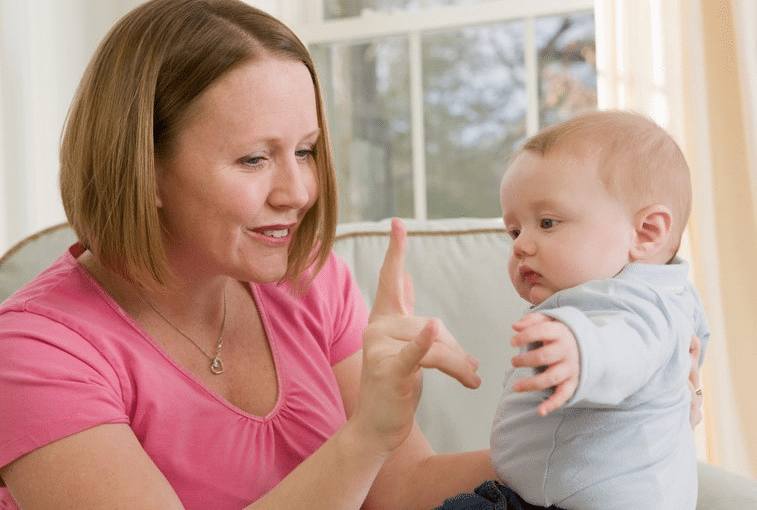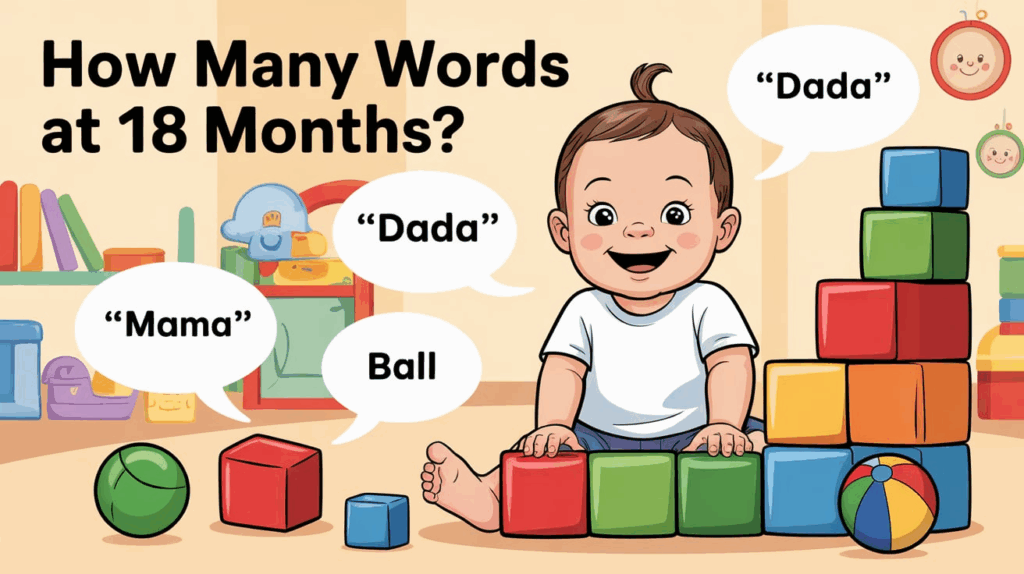Waiting for those first words spoken? As parents, we often worry when our toddlers aren’t talking as much as their playmates or when cousin Timmy was already speaking in sentences at this age.
It can be frustrating and concerning how many words at 18 months are communicated mostly through pointing and sounds rather than clear words.
Good news! There’s a wide range of what’s normal at this age. Most month-olds say between 10-20 words around, but some say fewer, while others may have 50 or more. What matters isn’t the exact number but their overall communication progress.
In the following sections, I’ll walk you through typical language milestones at this age and share practical ways to boost your little one’s talking skills.
What is the Typical Vocabulary Range for an 18-Month-Old?

At 18 months, most kids use about 10-20 words. Some might say just a few words spoken, while others might have up to 50 words around they can use.
These first words spoken are usually simple ones like “mama,” “dada,” “ball,” “dog,” “no,” and “more.” Your child picks words around that matter most in their little world – important people, favorite toys, or things they need.
| Language Milestone | Typical Range at 18 Months |
|---|---|
| Words around spoken | 10-20 words around |
| Words around understood | 50-100 words around |
| Sentence length | Single words around |
| Following directions | One-step commands |
| Communication methods | words around, pointing, gestures |
Don’t worry too much about how many words at 18 months. They can follow simple directions like “give me the cup” even if they can’t say all those words yet.
Every child learns language at their own pace. Some talk early, some talk later. What really counts is that your child is finding ways to communicate with you, whether through words, sounds, or pointing at what they want.
What is Considered a Speech Delay?
A speech delay happens when a child’s talking skills grow slower than expected. At 18 months, doctors often pay attention if a child uses fewer than 10 words.
By age 2, warning signs include having less than 50 words around or not putting two words together like “want juice” or “more cookie.” By 3 years, kids typically speak in short sentences that most people understand.
Speech delays look different from child to child. Some kids get everything you say but speak very little. Others might talk but use words around in unusual ways or repeat phrases without clear meaning.
Keep in mind that each child grows at their own speed. Some children say just a few words spoken until suddenly their language explodes. What matters most is if your child tries to connect with you somehow and keeps making progress.
If you are worried about knowing how many words around at 18 months a toddler will speak, then remember that each children grow at their own pace.
Individual Variations in Language Development

Not all children follow the same path when learning to talk. Language development varies greatly from child to child, with some speaking early and others taking more time.
Common Patterns in Language Development
| Age | Early Talkers | Typical Range | Late Talkers |
|---|---|---|---|
| 12 months | 8+ words around | 1-3 words around | Not talking yet |
| 18 months | 50+ words around | 5-20 words around | Fewer than 5 words around |
| 24 months | 300+ words around, sentences | 50-100 words around, two-word phrases | Fewer than 50 words around, no word combinations |
| 36 months | Complex sentences | Full sentences | Simple phrases |
Signs That Differences Are Normal
Most differences in language development are normal if your child:
- Understand what you say
- Uses gestures to communicate
- Tries to communicate in some way
- Plays and interacts socially
- Shows steady progress over time
Some children prioritize motor skills development, focusing on walking, climbing, and physical coordination before expanding their vocabulary. This “motor vs. verbal” focus is completely normal.
The key indicator of healthy development isn’t reaching specific milestones by exact ages but rather showing steady progress in communication skills over time. Each child follows their own developmental timeline.
How to Encourage Language Development at 18 Months
At 18 months, encourage language development by talking to your child regularly, narrating your actions, and reading books together.
Engage in interactive play and repetition to help expand their vocabulary and communication skills.
- Talk During Daily Activities: You can help your 18-month-old build language skills through simple, everyday activities. Describe what you’re doing when changing diapers, making meals, or giving baths. This natural conversation helps them connect words with actions.
- Create a Reading Routine: Choose books with simple pictures and few words. Let your child point to and name things they recognize. Aim for at least one story each day, but follow their interest level.
- Limit Screen Time: Real interactions with people teach language better than videos or apps. Focus on face-to-face communication whenever possible.
- Respond to All Communication: When your child points or makes sounds, answer as if they asked a question. This encourages them to keep trying to communicate.
- Use Real words: Skip baby talk and use correct names for objects, but keep sentences short and clear. Your child learns language from listening to you.
- Incorporate Music and Movement: Songs with actions, like “Itsy Bitsy Spider,” pair words with gestures, making language more fun and memorable for little ones.
- Follow Your Child’s Lead: Focus on what interests them, and they’ll be more motivated to communicate about it. The best teaching moments happen when your child is already engaged.
What Should You Do if You’re Worried About Your Child’s Talking?

If you’re concerned about your child’s speech development, don’t wait and wonder. Here are practical steps to take when you’re worried about how your child is talking.
Trust Your Instincts
Parents often notice issues before anyone else. If something seems off, it’s worth checking.
Track specific concerns, write down exactly what worries you
- Words your child can and cannot say
- How well others understand your child
- Whether your child follows directions
- If your child responds when called
Talk to your child’s doctor. Share your specific concerns at your next visit, or schedule an appointment specifically for speech issues.
Getting Professional Help
- Ask for a hearing test. Hearing problems can affect speech development, so this is often the first check.
- Request a speech-language evaluation. Your doctor can refer you to a speech-language pathologist (SLP) who specializes in children.
- Look into early intervention services. Most states offer free or low-cost evaluations for children under 3. Your doctor or school district can help you connect.
While Waiting for Help
- Read together daily. Point to pictures and talk about what you see.
- Turn off screens during talking times. Face-to-face interaction helps speech development.
- Narrate daily activities. Talk about what you’re doing: “I’m putting soap on the washcloth to wash your hands.”
- Repeat and expand on what your child says. If they say “car,” you can say, “Yes, blue car go.”
Early help makes a big difference. Many children catch up quickly with the right support. Acting on your concerns now is the best thing you can do for your child’s communication skills.
Don’t blame yourself if your child is having speech difficulties. Focus instead on taking positive steps forward to help them communicate better.
The Bottom Line
We’ve found out how many words at 18 months’ language development, from typical word counts to ways you can help them grow.
So what does this mean for you as a parent? Understanding these milestones helps you support your child’s unique language path without unnecessary worry. Every child develops at their own pace, and that’s perfectly normal.
What’s next? Start with one simple strategy from our tips section today. Perhaps read an extra book or narrate your daily activities more intentionally. Small, consistent efforts make a big difference.
Have questions about your child’s language development? Leave a comment below sharing your experiences or concerns. Other parents might have helpful insights to share, and we’re here to help too!
















